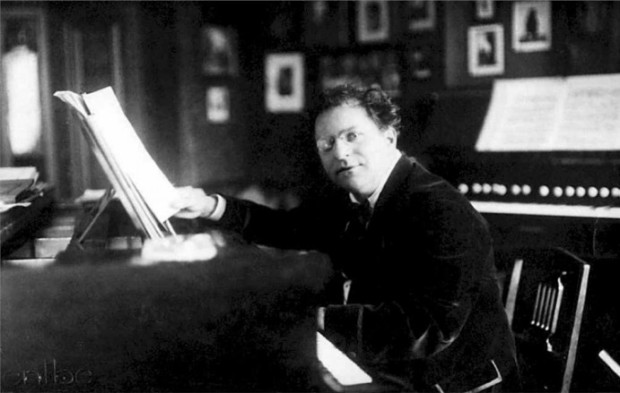Sigfrid Karg-Elert (born Oberndorf am Neckar, 21 Nov 1877; died Leipzig, 9 April 1933) was a German composer and teacher whose most notable influences included Carl Reinecke, Edvard Grieg, Claude Debussy, Arnold Schoenberg, and Alexander Scriabin. Though he is known to flutists for the Thirty Caprices, op. 107 and Sonata Appassionata, op. 140, he primarily composed for the organ and the harmonium.
Karg-Elert’s early musical training began in Leipzig at age five. He participated in a church choir, learned to play the piano, and studied composition with the church cantor. In 1891, he enrolled in a teacher training course in Grimma where he learned to play the flute, oboe, and clarinet. Before completing his studies in Grimma, he moved to Markranstädt to work as a freelance musician. He returned to Leipzig in 1896 to study at the Conservatory as a student of Carl Reinecke, among others.
In 1902, the Magdeburg Conservatory appointed Karg-Elert head of the piano masterclass. A year later, he met Edvard Grieg who introduced him to new areas of study, recommended him to publishers, and left a lasting influence on his compositional style.
The year 1903 marked the beginning of Karg-Elert’s steady output of works for the harmonium. August Reinhard, German composer and harmonium player, likely encouraged him to compose for the instrument. The harmonium, also known as the pump organ, is a small, often portable, reed organ operated by foot-pumped bellows. Karg-Elert specifically composed for the Kunstharmonium, a larger, German version of the instrument with a wider range of capabilities. He composed most of his Kunstharmonium music, along with much of the rest of his output, before World War I. During the war, he served as a regimental musician after he was denied active service due to his musical reputation.
The Leipzig Conservatory appointed Karg-Elert instructor of music theory and composition in 1919 at the conclusion of his military service. He experienced a decline in his popularity as a composer in Germany after the war due to his fame in England and cosmopolitan writing style, two undesirable traits in a nationalist post-war country. His works, however, have since experienced a revival.
In the grand spectrum of Karg-Elert’s total compositional output, his flute compositions fall into the rare category of works completed after the on-set of World War I. Alwin Wollinger counts twenty-two completed works for the flute in his book, Die Flötenkompositionen von Sigfrid Karg-Elert. Karg-Elert composed seven of the twenty-two works during WWI– Sinfonische Kanzone, op. 114, for flute and piano (1917); Sonata Appassionata, op. 140, for flute solo (1917); Sonate in B flat Major, op. 121, for flute and piano (1918); Jugend, op. 139a, for flute, clarinet in A, horn and piano (1918/19); Thirty Caprices, op. 107, for flute solo (1918/19); Impressions exotiques, op. 134, for flute and piano (1919); and Suite pointillistique, op. 135, for flute and piano (1919). The impetus for this sudden outpouring of flute music was a friendship forged with flutist Carl Bartuzăt. In the preface to his Thirty Caprices, Karg-Elert writes:
These Caprices, as well as my other works for flute, composed between 1915 and 1918, owe their inception to the eminent artist Carl Bartuzăt, principal flutist of the Leipzig Theatre and Gewandhaus-Orchestra at whose side I played the oboe in a good military band during the war.
The performers that surrounded Karg-Elert largely influenced the course of his compositional path at different points in time. Just as August Reinhard encouraged him to write for the harmonium in the years before the war, Carl Bartuzăt inspired him to write for the flute during their time spent as regimental musicians.
Conley, Frank. “Karg-Elert, Sigfrid.” Grove Music Online. Oxford Music Online. Oxford University Press, http://www.oxfordmusiconline.com/subscriber/article/grove/music/14710 (accessed May 7, 2013).
Karg-Elert, Sigfrid. “Preface to the 30 caprices.” New York: Carl Fischer, 1969 as quoted in Tsai, Chia-Fen. “The ‘Thirty Caprices’ of Sigfrid Karg-Elert: A Comprehensive Study.” City University of New York, 2008, http://search.proquest.com/docview/304669618?accountid=14541 (accessed May 6, 2013).
Wollinger, Alwin. Die Flötenkompositionen von Sigfrid Karg-Elert. Frankfurt am Main, Germany: Haag und Herchen, 1991 as cited in Tsai, Chia-Fen. “The ‘Thirty Caprices’ of Sigfrid Karg-Elert: A Comprehensive Study.” City University of New York, 2008, http://search.proquest.com/docview/304669618?accountid=14541 (accessed May 6, 2013).


One comment